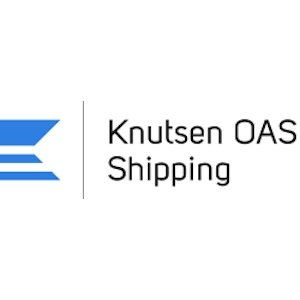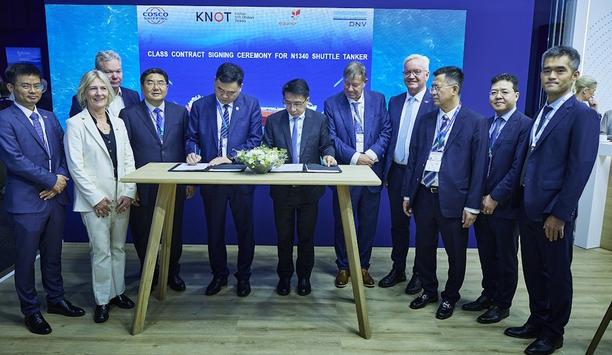Knutsen OAS Shipping - Experts & Thought Leaders
Latest Knutsen OAS Shipping news & announcements
Classification society - DNV has signed a new contract with Cosco Shipping Heavy Industry Zhoushan Shipyard (COSCO) during Nor-Shipping 2025 for the classification of a newly contracted methanol-ethanol ready Suezmax DP2 shuttle tanker ordered by Knutsen NYK Offshore Tankers (KNOT). The vessel, part of a broader fleet expansion by KNOT, to be operated under charter to Norwegian energy major - Equinor, marks the latest milestone in a long-standing collaboration between the companies. Suezmax DP2 shuttle tanker The 154,000-deadweight-tonne (dwt) shuttle tanker features dual-fuel capability with methanol-readiness The 154,000-deadweight-tonne (dwt) shuttle tanker features dual-fuel capability with methanol-readiness, and complies with IMO NOx-Tier III and EEDI Phase 3 regulations. The advanced vessel design is another demonstration of how technical innovation and global partnerships are enabling the maritime industry to meet environmental requirements, and enhance sustainability and safety, while remaining efficient and competitive. KNOT, DNV, and Equinor partnership Guo Zhiqiang, Deputy General Manager, Commercial Headquarters, COSCO Shipping Heavy Industry, said: “We, COSCO Shipping Heavy Industry are pleased to see this great milestone achieved for the exciting project. We appreciate the trust and support from our partners, namely KNOT, DNV, and Equinor in the past years.” He adds, “COSCO Shipping Heavy Industry have delivered more than ten 154K DP shuttle tankers for KNOT together under the classification of DNV, and this project will be the first DP shuttle tanker we build for world first class oil major - Equinor.” Guo Zhiqiang continues, “We are proud of it and committed to implement with our high QHSE standards during the project execution and deliver a most satisfied shuttle tanker to our partners. This new milestone is a new start, and we also look forward to seeing future cooperation among the parties.” DNV and COSCO sign contract for DP2 Shuttle Tanker Tom Ketil Knutsen, General Manager Newbuiding & Innovation at KNOT, said: “We are proud to attend the signing of a new contract between DNV and COSCO SHIPPING Heavy Industry (Zhoushan) Co., Ltd, for a 154.000 dwt DP2 Shuttle Tanker, set for delivery in early 2028.” Tom Ketil Knutsen adds, “Knutsen NYK Offshore Tankers are thrilled to mark this as another exciting chapter in the enduring relationship between DNV, Equinor and Knutsen - a partnership rooted in mutual trust and collaboration from our early beginning in the North Sea to our expansion into the Brazilian waters. This milestone not only strengthens our bond but also celebrates the continued success of our collaboration.” Support the expansion of KNOT’s shuttle tanker fleet Øyvind Pettersen, Head of the Technical Centre China at DNV Maritime, commented: “At DNV we are very pleased with the trust placed in us as the classification partner for this exciting new project, and to support the continued expansion of KNOT’s shuttle tanker fleet. Each COSCO newbuilding reflects a shared commitment from all partners to safer, lower-carbon, more efficient, and technically advanced offshore operations.” Øyvind Pettersen adds, “We are committed to providing the independent assurance and technical standards that are helping to bring greater transparency and trust to these investments and look forward to continuing this productive cooperation. In addition, DNV extend our heartfelt congratulations to KNOT as they celebrate their 40th anniversary, made even more special by marking it here at Nor-Shipping.” Vessel to be equipped with McGregor's bow loading system The vessel will be equipped with a fifth-generation bow loading system developed by McGregor, to enhance the safety and efficiency of loading from offshore production units in challenging sea conditions. In addition, it will be shore power ready and fitted with VOC prevention systems to reduce operational emissions. This is the sixth vessel in a current series of newbuilds placed by KNOT at COSCO, bringing the total number of DP2 Suezmax shuttle tankers ordered by KNOT at the yard to 12 vessels.
At the 60th anniversary of the Nor-Shipping maritime trade fair, ABS issued approval in principle (AIP) to Knutsen NYK Carbon Carriers (KNCC) for its novel design for a 40,000 cbm liquefied carbon dioxide (LCO2) carrier. A first in the industry, the LCO2-EP carrier concept from KNCC aims to transport and store LCO2 at near ambient temperatures and under elevated pressure using a modular approach, allowing less cooling and potentially larger carriers for transport. ABS completed design reviews based on class and statutory requirements. Cutting-edge containment technologies “Carbon capture and transport are essential pillars of the carbon value chain, playing an important role in the industry’s efforts to reduce emissions. ABS recognises that collaboration is key to these advancements, and we are delighted to work with forward-thinking innovators like KNCC to drive the development of cutting-edge containment technologies for LCO2,” said Patrick Ryan, ABS Senior Vice President and Chief Technology Officer. “We are proud to receive this approval in principle from ABS, which marks a significant milestone in our commitment to advancing safe and scalable carbon transport solutions. KNCC’s commitment to excellence is evident in its rigorous approach to novel vessel design and collaboration with leading classification societies such as ABS,” said Oliver Hagen-Smith, CEO at KNCC.
Knutsen NYK Carbon Carriers AS, a subsidiary of Nippon Yusen Kabushiki Kaisha and Knutsen Group, has obtained Approval in Principle from ClassNK for the design of liquified CO2 carriers that use the elevated pressure method to store and transport liquefied carbon dioxide at ambient temperature. ClassNK has carried out a design review of this ship in accordance with the Rules for the Survey and Construction of Steel Ships, 'Part N', and has issued an Approval in Principle after confirming that the ship meets the prescribed requirements. Advancing carbon storage The LCO2-EP carrier uses LCO2-EP Cargo Tank technology developed by KNCC to transport LCO2The LCO2-EP carrier uses LCO2-EP Cargo Tank technology developed by KNCC to transport LCO2 in a stable state. Since there is no need to cool LCO2 to cryogenic temperatures, it is easy to handle and potentially reduces energy and costs during liquefaction. NYK, KNCC, and ENEOS Xplora Inc. have developed a Floating Liquefied Storage Unit that combines the LCO2-EP Cargo Tank technology with the Isenthalpic Expansion Cooling & Liquefaction Process. This Process has been researched and developed in collaboration among the three companies. ClassNK has issued an AiP following a review based on the Rules for the Survey and Construction of Steel Ships, 'Part PS', 'Guidelines for the Design of Floating Liquefied Natural Gas and Liquefied Petroleum Gas Production, Storage, Offloading and Regasification Units', etc. Innovative carbon solution This FLSU is a pioneering concept that liquefies and temporarily stores CO2 that has been collected and transported as gas in an onshore facility making it ready for further transport by LCO2 carrier. By utilising the features of the EP method, which has the potential to reduce the energy required for liquefaction, and adopting the Process, which is expected to be simpler and more compact than conventional cooling methods, it has become possible to install a liquefaction plant on a floating structure. Scaling carbon solutions Carbon Capture, Utilisation and Storage is one area that is expected to play a certain role in achieving a carbon-neutral society. However, issues need to be addressed, such as reducing overall costs and securing land for liquefaction and storage facilities. By utilising this FLSU, the cost of CO2 liquefaction and the land area required onshore in the CCUS value chain can be reduced, expanding the possibilities for realising CCUS. Towards a greener future NYK, KNCC, ENEOS Xplora, and ClassNK will continue to contribute to realising a carbon-neutral society by examining various technologies and assessing their economic and safety aspects towards achieving a CCUS value chain.




